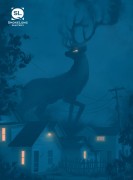This is a breathtaking piece. Let me begin by saying how much I admired the ambition of the story through the tension of its physical construction matching the tension of narration. It left me breathless until the last second when that ending, that last period, brought relief. Why did you make the choice to tell the story in one sentence? Are you usually experimental with your work?
I imagined that a good old friend who I had not seen in many years had visited me. I wanted to tell him about the story that I had been planning to write for months but had been very lazy to work on. And so I ended up chattering away the story to him on the pages of my notepad. It wasn’t until weeks later when I returned to the story that I realized what I had done. I wanted to tear up the entire thing. Had I written the story out of the euphoria of having an old friend visit? Was I willing to take up the risk that came with this sort of writing? Stories are a special, delicate thing to me. I am always deeply concerned by how stories are told. When I began to rewrite the story, breaking up its one-sentence form, the writing seemed dishonest to me, and I decided I would leave the story in its original one-sentence form. This conscious decision to tell the story in one sentence also stems from wanting to write a kind of story I would love to read. I don’t actively think of experimentation when I write. I am only a medium; I allow stories to lead me.
The use of this omniscient second person in this story means that it grabs the reader by the neck and forces them to watch, in fascination and horror, what is happening. Can you talk about how you arrived at that choice?
My imaginary friend arrived on a rainy night. I had returned from the gym, all wet and cold. I sat at my desk to a cup of hot chocolate, and there he was in my room, lying on my bed. As the house was exceptionally quiet and I was glad to have a visitor, I wanted to gossip away with my friend all night about this interesting boy who I had been observing for a while. And as it is with every gossip, the narrator seems to be everywhere and know everything.
I am fascinated by the character of the father in this story, in the absolute way in which he bends his surroundings to him, the overwhelming “maleness” of him. It is ironic, then, that there is a hint of a complaint, a sadness, at the boy’s mother not being able to see him for who he was, or at perhaps not seeing at all. How do you see those relationships?
Perhaps the boy’s mother sees the boy’s father, knows him for all he is, but yet she stays, taking all of it in, in the preconceived manner the world imposes how and how not women are to act. There are many permutations to those relationships. I come from a tradition—or traditions, as I’m Igbo and Catholic—where the man is often assumed to be a godlike figure and the woman is always expected to be submissive to the man, and marriage is such a sacred bond that the society is quick to ex-communicate either party that chooses to leave. In one way, the boy’s father is that dominant man who may care about family and still revels in the societal construct of male privilege, and the boy’s mother is that malleable woman who has to endure the man’s assholery so that she, too, is acceptable by society. In another way, like you rightly said, the boy’s mother is unable to see the man or she chooses not to see him. Perhaps this is her way of staying sane in a difficult marriage. Or perhaps she desires that the boy be raised in a “proper” family.
Reading this felt like an experience. What do you think it intends to leave the reader with?
I hope the reader enjoys reading the story as much as I enjoyed writing it. I hope the reader finds ways to experience the story in many other ways that I never did.
And because the brain that creates a story is just as interesting as what comes from it, I must know what drives you to write. Do you write short fiction a lot, and if so, what is it that you like about it?
I write because there are so many things—truths, especially—that I care about and would like for the rest of the world to care about as well. I write because my life will be meaningless without it. Above all, I write because it is one of the many things I love to do. For now, I do a lot of short fiction. I have plans for longer projects. But because I squander a lot of time looking up new food recipes and admiring contemporary male fashion on the internet and I divide my time between my day job as a business analyst and my active search for ways to further my engineering career, I haven’t quite gotten around to working on longer projects. This isn’t to say that my short fictions always take a short time to complete or are easier to do. There are short stories and flash fictions that have taken me two or three years to finish. I like that short fiction tasks me to create engaging worlds in few words. I like that I can go wild in short fiction and sustain this wildness in a short space.




 The core workshop of SmokeLong Fitness is all in writing, so you can take part from anywhere at anytime. We are excited about creating a supportive, consistent and structured environment for flash writers to work on their craft in a community. We are thrilled and proud to say that our workshop participants have won, placed, or been listed in every major flash competition. Community works.
The core workshop of SmokeLong Fitness is all in writing, so you can take part from anywhere at anytime. We are excited about creating a supportive, consistent and structured environment for flash writers to work on their craft in a community. We are thrilled and proud to say that our workshop participants have won, placed, or been listed in every major flash competition. Community works.